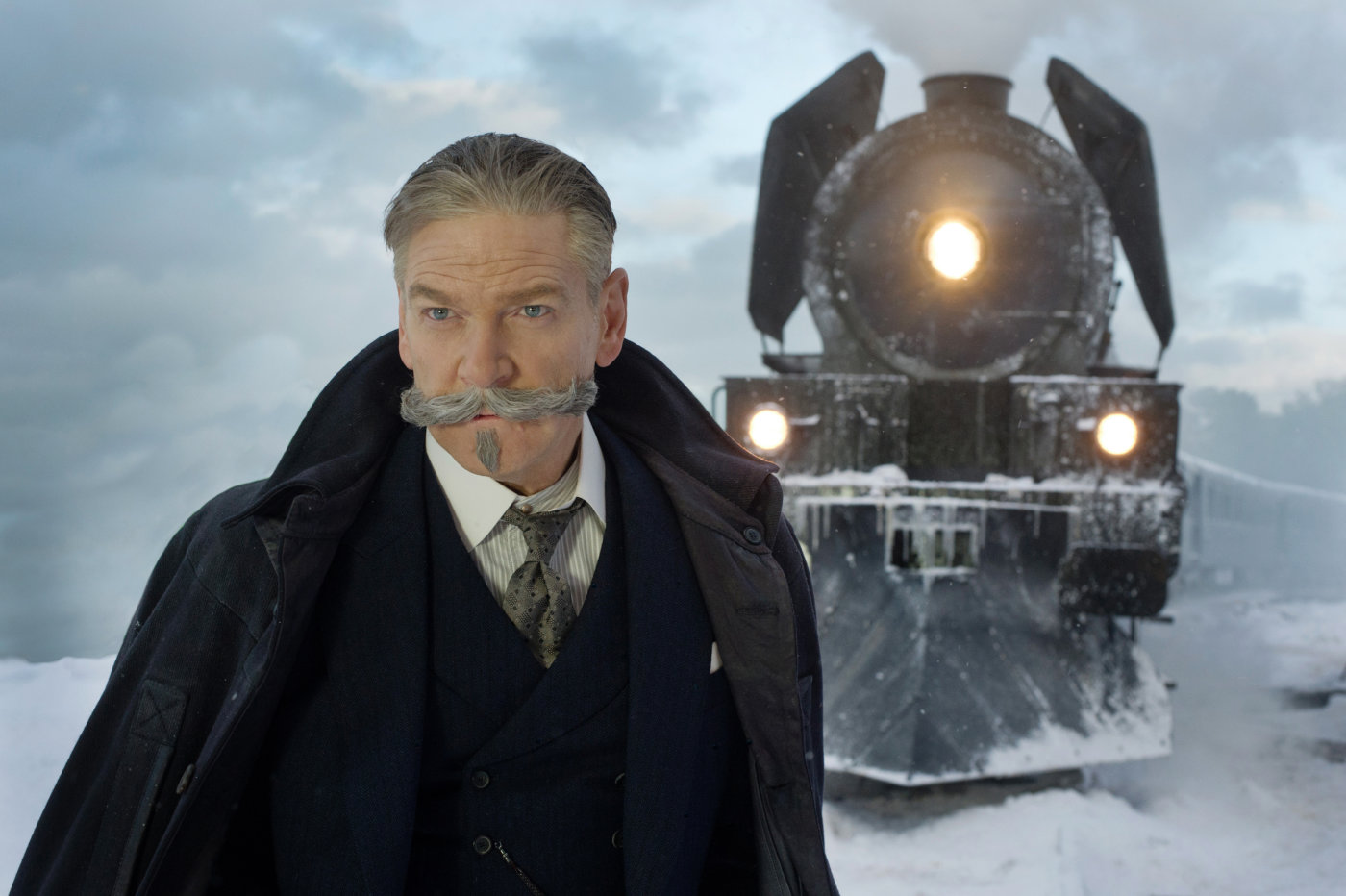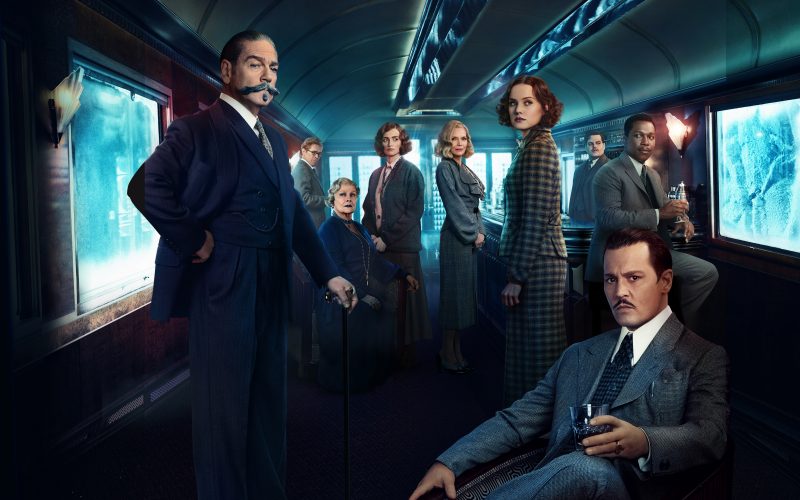Murder on the Orient Express (2017) – Review.
Kenneth Branagh directs and stars in this remake of an adaptation, and the 2017 rendition of Agatha Christie’s famous novel is occasionally funny, sometimes tense, and infrequently compelling. Unfortunately, it trips over its own feet and pulls the rug out from beneath us far too slowly.
Murder on the Orient Express is a gorgeous looking film. It features an all-star cast, lead meticulously by Branagh as Hercule Poirot. The opening scenes are quirky in all the right ways, inviting us wholeheartedly into the mind of a man who misses no detail and takes perfectionism to a new high. How then, does it take him such a long time to figure out the mystery, considering how utterly coincidental so many of the reveals happen to be? For a man that would not believe in coincidence, it seems uncharacteristically short-sighted.
The first hour is an absolute joy. During this hour we’re introduced to all of the characters as circumstance brings them together on a train journeying from Istanbul to London. The interactions are all worthwhile, thanks almost entirely to the performances we’re gifted from the likes of Johnny Depp, Penelope Cruz, Judy Dench, Willem Dafoe, Josh Gad, Michelle Pfeifer, and Daisy Ridley. Seeing these actors go one on one allows us to see different personalities and people of different backgrounds interact while trapped in a moving carriage, but it’s quite novel in retrospect.  Once the murder in question takes place things start to heat up, but Poirot loses some of his charm when it becomes about the job. Instead of endlessly eccentric and off-kilter, he becomes workmanlike. Branagh still maintains the character’s oddball accent and mannerisms, but Poirot doesn’t get to entertain his defining idiosyncrasies with the same level of freedom when there’s a murder to solve. Still, his interrogating of all of the suspects makes for some of the most delightful scenes, even if the film starts to suffer from pacing issues as it begins to drag us through the sleet.
Once the murder in question takes place things start to heat up, but Poirot loses some of his charm when it becomes about the job. Instead of endlessly eccentric and off-kilter, he becomes workmanlike. Branagh still maintains the character’s oddball accent and mannerisms, but Poirot doesn’t get to entertain his defining idiosyncrasies with the same level of freedom when there’s a murder to solve. Still, his interrogating of all of the suspects makes for some of the most delightful scenes, even if the film starts to suffer from pacing issues as it begins to drag us through the sleet.
It’s here that the entire thing starts to feel long in the tooth. The interrogations are enjoyable, but there are perhaps too many of them. The film then goes in circles on just who the murderer is, and even includes a chase sequence that plays out like a studio mandated requirement but lacks any of the excitement it apparently hopes to incite. When the pieces start to fall into place, it demands an explanation. That explanation is delivered in an overlong scene which seemingly rids the film of any of its remaining tension. When the characters start exiting the train, after an avalanche stalls the journey completely, that claustrophobic tension evaporates into the chilly night air. Still though, the wintery aesthetic is stunning; the screen becomes a canvas onto which the scenery has been carefully painted, and contrasts sublimely with the lavish and moodily lit innards of the carriages.
From a production standpoint, Murder on the Orient Express is immaculate. From the set design to the costuming, it’s all reminiscent of an old-fashioned style of storytelling, the kind of film you’d sit back and watch on a cold and dreary night at home, with a hot drink by your side. Its humour hits the right chord more often than not, and far more often than its drama does. The stakes never feel all that high. There’s intrigue to be sure, but there’s little in the way of concern for the remaining passengers onboard. This is in large part due to the fact that, outside of Poirot, the supporting characters feel like blank boards, pretty cutouts to stand in the foreground. Sometimes they transcend their own emptiness and wax poetic about their worldviews. Throwing contrasting cultures under the same roof can often make for some crafty and engaging interactions, though the novelty dries up quickly here.  Branagh’s performance as Poirot is the best part of the film. It’s a shame that the tone of the first half has to be diminished for the sake of its grim-dark material. The backstory behind the murder itself unravels gradually, and it’s well handled and suitably crushing. The unfortunate truth is that there seems to be a belief here that a mix of action and abnormality will grip its audience for the stretch of its runtime. The identity of the murderer, strangely enough, seems of little consequence, and yet we also care too little about the characters to worry about anybody being next on the chopping board. Pfeifer is impressive later in the film, perfectly delivering the pain and anguish her character has suffered. The finale has the potential to play around with the concept of morality, but it ultimately feels hollow.
Branagh’s performance as Poirot is the best part of the film. It’s a shame that the tone of the first half has to be diminished for the sake of its grim-dark material. The backstory behind the murder itself unravels gradually, and it’s well handled and suitably crushing. The unfortunate truth is that there seems to be a belief here that a mix of action and abnormality will grip its audience for the stretch of its runtime. The identity of the murderer, strangely enough, seems of little consequence, and yet we also care too little about the characters to worry about anybody being next on the chopping board. Pfeifer is impressive later in the film, perfectly delivering the pain and anguish her character has suffered. The finale has the potential to play around with the concept of morality, but it ultimately feels hollow.
Murder on the Orient Express is a unique modern experience. On the surface, it’s an exquisite and delicate period piece filled with rich and colourful people, and it’s an anomaly in today’s blockbuster climate. For that, we can be grateful that this is slotted in amidst the season’s major action pictures. Unfortunately, the film falls short mostly in the latter parts of its second act and the entirety of its third. A sequel is dangled in front of us, and there’s definitely room for refinement here. The visuals are on point, though it’s hard to imagine this particular train can keep moving into franchise territory.
Film ’89 Verdict – 6/10
Murder on the Orient Express is in cinemas now.

